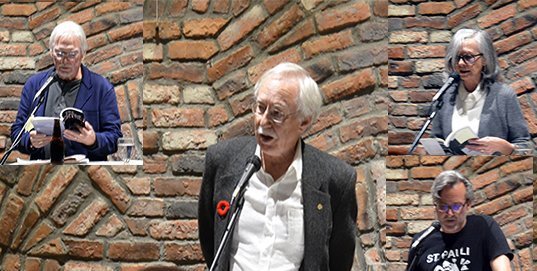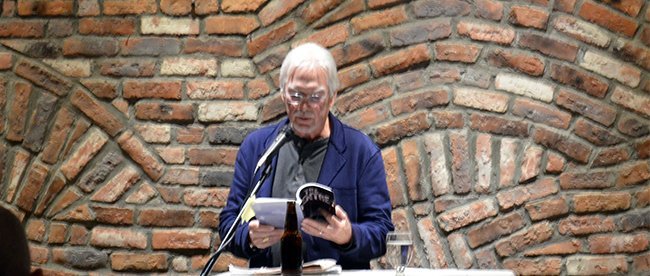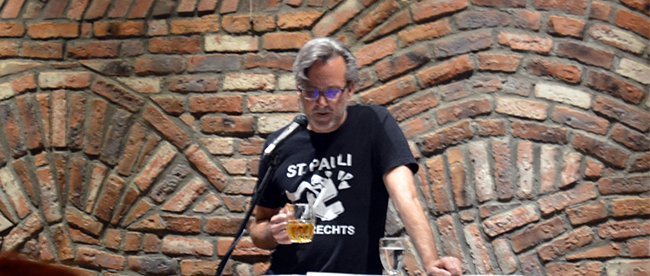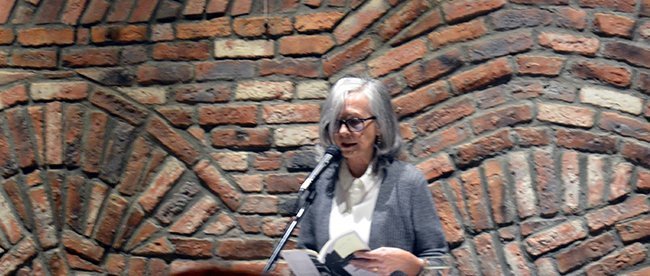
John Harris Introduces Launch of the Receiver
Welcome to the latest in Graham Pearce’s events, sponsored by the College of New Caledonia. I’m John Harris, and Graham asked me to introduce our readers tonight, Barry McKinnon, Sharon Thesen, and Greg Lainsbury. They’ll read in that order, and then again after a short break, and then take questions.
I’m here in my role as a critic, I think, unless Graham is indulging some false sense of deference because I preceded him in the classroom at CNC for so many years, or a false sense that I might know more about these poets than him or others around town just because I’ve written about all three. But I have, it seems, acquitted myself fairly well in their eyes, though I know that Lainsbury has some in my mind minor issues. If you notice him following me into the washroom, please dial 911.

These three writers have interesting and original poetic personas, which, incidentally, is why I intend to refer to them, less formally, by first name, or by the names of their personas, like Jack the Organizer. Jack is Barry, as many of you know. I’m also interested in them because they share a determination to fight to keep their poems free of ideology, of themes, of morals. It’s my job to put those things into their poems, to speculate on the moral of the anecdote, the picture, the rant. Ideologies are death to poetry which I take to be, after Red Lane, “a sort of introspection, but not from the outside looking in, or the inside looking out, but the outside looking inside out.” Ideologies stall this essential dialectic. They are totally outside.
Another incidental remark, for the second and last time I hope, Red Lane was the brother of Pat Lane, who delivered that great convocation address at UNBC last spring, and Red was no less a poet than his more famous brother.
I’ll talk about the figures our poets cut in their own poetry, then about the problem with ideologies and how they’ve handled it.
Barry I’ve long pictured as the man on the dump, one of Wallace Steven’s poetic personas. I’m not saying Prince George is a dump any more than any other urban assemblage (well, maybe a bit more), but you’ll notice that in his poems Barry spends a lot of poetic time wandering around the area noting what’s there and what might be behind what’s there. The dump represents “The the,” as Stevens has it. It is a graveyard for things. It represents mortality, or death, definitely the ultimate article. The the is also the title of Barry’s first collection of poems.
The poet itemizes the dump: “the wrapper on the can of pears, / The cat in the paper bag, the corset, the box / From Esthonia: the tiger chest, for tea.” The poet sits among “the mattresses of the dead,” and finds things of appealing shape, color and even smell. Barry does the same sort of itemizing, referring to the style as “woolcoco,” after Woolco, the store that used to anchor the south end of Pine Center Mall. He’s especially fond of attaching prices to the things listed. At times, as when the sun goes down or the breeze picks up, the poet can even find the whole assemblage beautiful, a kind of impressionistic montage. Maybe the junk in Woolco used to look like this when they turned the lights down at night.

Barry’s own characterization of the poet is presented in his poem “The Organizer,” a poem that I believe Barry will read tonight. Jack is the guy voted by his service club or whatever to run the annual party, which includes a beauty pageant. This is the dump that Jack is on. Barry calls Jack “a kind of poet.” He has to worry about chairs, tables, and paper cups — the itemizing again. He has to break up fights, and to clean up after partiers who are throwing up on everything including him. Therefore he has to try to be sober. Jack is aware that his responsibilities, especially the last one I mentioned, are a bit beyond him and thinks “I wear elevator shoes and / am responsible for everything — the trophies, the paper plates . . . .” And the poet, his alter-ego, remarks, “Who will clean / up — who will see the last drunk home / who will care. You will Jack.”
Awhile ago, the local poet and arts impresario Jeremy Stewart and I matched quotes from “The Organizer.” Jeremy was financial manager of the P G Symphony at the time, and before we spoke I’d been gleefully in the audience watching him on stage in suit and tie. His job was to pump the audience for more money. He knew Barry’s poem better than I did, because he recognized himself in it. He especially remembered the last lines: “you’re nothing Jack, in your elevator shoes. They chose you for no reason. But / they knew you could do it.”
Greg sees Fort St. John, its environs and so the world at large as a dump, and engages in the same itemizing. But Greg’s approach to being the man on the dump is more like Hamlet’s. What are you supposed to do when you see the world as out of joint and you have to set it right? What do you do when you live in the oil patch, the “Energetic City,” and watch the forces of economic progress carve up nature and human nature? Greg is as pissed off at the situation as Hamlet, and even more cynical.
He’s more learned too, delivering his soliloquies, some in the third person like Jack’s, but with references to Aristotle and other thinkers, as well as to left-brain and other theories. I’ve compared him to a hero of mine, and of Sharon’s, Samuel Taylor Coleridge, the ultimate “whirlbrain” as STC’s neighbors used to call him. Also, Greg echoes voices from literary and biblical text, all by way of describing the situation to himself and expressing his own inadequacy. Greg’s soliloquies are Shakespearean, right down to the archaic phrasing: “To be in all this a moral lever to prise open our own condition, ruthless, savage & rigorous . . . . Then comes the turn; the speaker’s identification becomes literal . . . How can a man like me be expected to live & work under such conditions? Why, cast all thou hast into the fire, of course!”

It’s hard to see Sharon as someone chronicling shifting perceptions of a dump. When she falls to pieces she’s usually somewhere like in her BMW pulling into Faculty Parking. But falling to pieces is to be on the dump, and Sharon presents it not as woolcoco or Shakespearian tirade but Patsy-Cline style, consciously on stage, impeccably dressed, voice under control.
If you want to know how to fall to pieces elegantly, like say when seeing off a husband, read “It Being Over:” “Better watch out for ladies like me / with lots of books and little patience. /Too easily won / Too willingly lost / this is a requiem, believe it or not, / why else would I be listening / to that cello & writing / sentimental poems / on a rainy, terrified / night in march.” Or read “Confession:” “A terrifying hangover / made even crazier / by this brilliant sun, / so close the curtains / & go upstairs / into the dark / this is / a place / to be. I don’t want / to go to Greek Day / I want this darkness / & hate it, you too.”
Sharon visualizes poetry as an adult child. She addresses it in baby talk, in third person instead of second, like a mother describing her son to himself, crooning it in rhyme and meter: “It live under the stars. / It be a handsome man. / It gather the bay leaf for a crown. / It dance at the wedding party / up and down. / It love licorice ice cream cone / It hang out at the roller dome. / It ask the book for answer. / It feel all alone / It feel everything It be alive. / It dream under the covers and / in the car / It laugh at the Polish joke / It sing along / with the singalong. / It map the heavens / It be a handsome man / It gather the bay leaf / for a crown / It dance at the wedding party / Up and down.”
In connection with these motherly feelings towards poetry, Sharon has fought hard to protect it from ideologies, which leads to my second point about these poets. Greg fights ideology through his poetic persona, but maybe also in the arena of literary politics as Sharon does. I don’t know him well enough yet to say. Barry fights in the way he advised me to fight one night in the Columbus Hotel as we were watching some guys rolling around on the floor. “Lay down in a fetal position,” he said, “cover your head with your hands, and let them kick you until they get tired and go away.”

I don’t know if Greg’s ever been approached by the morality police, that fundamentalist branch of the postcolonialist establishment that finds a home at the university and concerns itself with identity politics and political correctness. Awhile back, up at UNBC, some fundamentalist professors interrogated local actress Grace Dove who played Leonardo diCaprio’s dead love in the movie The Revenant. The professors eviscerated the movie, as Citizen reporter Frank Peebles put it, for implying that French fur traders were worse than English fur traders, for making women look bad in that a grizzly sow would never really be that vicious, setting such a bad example in front of her cubs, and for foregrounding the heroism of whites over aborigines. They suggested that maybe Grace Dove select scripts that were more politically correct.
Grace thanked them for pointing out things in the movie that she’d never thought of, probably thinking that you’d have to be a moron to think like that. Then she evoked the spirit of her grandmother who supported her in her career. How could they deconstruct that negatively? She showed class, unlike the professors.
Incidentally . . . I know I promised not to use this word . . . incidentally, as a critic, I thought that the real problem with the movie was the plot, especially the part where the hero, after being mauled by the bear and buried alive by his partners, crawls out of his grave, floats down a river in water so cold that would kill you in two minutes in a fur coat that must have weighed two hundred pounds by the time he got ashore. After this he catches a salmon with his bare hands and lights a fire with two wet rocks.
Barry rose to Grace Dove’s defense — I hesitated to use that clichéd trope, but I’m sure you’ll take it as a harmless joke. I think he did it because he’d been attacked for writing a book about his grandparents settling in the prairies. A book called I Wanted to Say Something. The morality squad reminded him then that as a poet he is now required to cast off these grandparents, no matter how much he loved them. Did they not fence off the prairies, destroying the buffalo, the Blackfoot, and the original grasslands? Previously, he’d been burned for publishing a volume of interviews with Canadian poets who also ran publishing houses and magazines. All men. I thought about warning him at the time, but I was one of those men so I selfishly kept my mouth shut.
Sharon fights back in defense of her handsome man-child, as viciously at the sow grizzly took on Leonardo, the viciousness compounded by the grace with which her blows are delivered. She gives the impression that she doesn’t want to fight, any more than she did when we all took on the Moral Majority back in the seventies and eighties. Jerry Falwell didn’t want sex and four-letter words in poetry. Or when we took on the commies, who were riding a wave at that time after helping save democracy from Hitler, and after taking Cuba and gotten Che’s admittedly classy image onto just about every T-shirt in the world. The commies wanted you to forget about things like BMW’s, your love life and sunsets over the dump because such concerns were a sign of bourgeois decadence. If you fell to pieces over anything it was supposed to be setbacks in the struggle of workers to take control of the means of production. Sharon ignored all of this, even though a lot of workers in the literary vineyard in Vancouver at the time were commies. Now, communism is regarded as nothing less than weird, like scientology.

I think she was under even greater pressure from the radical feminists. In a 2008 interview with a poet of this persuasion, Daphne Marlatt, she was asked about the ”wider social critique” registered in her poetry. Sharon said, and this sounded to me uncharacteristically grumpy, “Poets shouldn’t have to concern themselves with the role poetry should or can play in society.” She added, “I don’t think it’s a great time for poetry right now.” As usual, she was specific in listing her reasons, one of which was “the trickle-down of academic poststructuralism.”
The radical fems wanted everyone, especially women admired for their poetry, to take on the patriarchy, an unlikely conspiracy of intelligent men (which is an oxymoron), and recognize that language itself, never mind western civilization with its science, democracy and BMW’s, was complicit with the suppression of women. You were supposed to talk about these themes in poetry and you were supposed to reject linear constructs in your writing, like the logic of induction / deduction and cause / effect. Rationality was a male trap. Sharon, a clear thinker, didn’t go for any of this.
I urge you, if you have a passion for poetics and literary politics, to read Sharon’s essays on these subjects. There’s one in the back of her latest book, The Receiver, on sale in the corner of the room. There was a famous one in Vancouver Review in 1991, where she took on professor Smaro Kamboureli, who runs the TransCanada Institute, a think tank and publishing house dedicated to the pursuit of identity politics in literature. Ideologies again. TCI is defunct now, but still kicking. Before it died, it published a long list of professorial self-indulgences, what I like to call biographia academia, and I’ve been fool enough to review some of them. I’m working right now on Fred Wah’s Faking It, a handbook of ethnopoetics that claims that to write ethnically is to write ethically, and that blacklists the WASP feminist Margaret Atwood, the Chinese poet-novelist Evelyn Lau, and the aboriginal poet Marilyn Dumont for bad writing, bad ethics.
Sorry. I’m getting upset. It’s time for poetry. Starting with Jack, who is not, I notice, wearing his elevator shoes tonight.